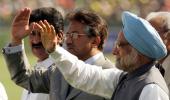With Imran Khan's sentencing and quick arrest on Saturday in a corruption case, Pakistan has maintained its notoriety for jailing former prime ministers while shying away from taking any action against military dictators who repeatedly violated the Constitution.

Khan, the chief of the Pakistan Tehreek-e-Insaf (PTI) party was arrested from his Zaman Park residence in Lahore after an Islamabad-based sessions court sentenced him to three years in prison on the charges of hiding the proceeds from the sale of state gifts from the Toshakhana.
The Toshakhana is a department under the Cabinet Division that stores gifts given to rulers and government officials by heads of other governments and foreign dignitaries. Khan bought some gifts including a precious watch given to him by the Saudi crown prince and sold the same for profit.
The 70-year-old leader was authorised to buy the gifts from Toshakhana and also carry out the sale but failed to inform the Election Commission of Pakistan about the money he made for which he was accused of concealment which is a crime under the law.
In better times, Khan might have escaped with a warning or a fine by the court, but he had already run out of luck when he fell out with the powerful military establishment that led to his ouster from the government in April last year.
Khan is not the first Pakistani premier to end up in jail, the country has numerous unenvious examples of the treatment meted out to elected leaders in its sordid history.
The first on the list is Hussain Shaheed Suhrawardy, a Bengali politician from then East Pakistan who served as the fifth prime minister. He was arrested in January 1962 and put in jail on bogus charges of “anti-state activities”. His actual crime was his refusal to support military ruler General Ayub Khan.
Zulfikar Ali Bhutto, who served as the ninth prime minister, was arrested on the charges of conspiracy to murder a political opponent in 1974. He was sentenced to death and hanged on April 4, 1979.
Benazir Bhutto served as the premier twice from 1988 to 1990 and again from 1993 to 1996. The country's only woman prime minister was arrested several times -- first in 1985 and put under house arrest for 90 days.
In August 1986, she was arrested for denouncing the military dictator Ziaul Haq at a rally in Karachi. In April 1999, she was sentenced to five years imprisonment for corruption and disqualified and fined more than 5 million pounds. She avoided arrest as she was in self-exile.
Nawaz Sharif was arrested in 1999 after General Pervez Musharraf took over and later on exiled for 10 years.
In July 2018, he was sentenced to 10 years in jail along with his daughter Maryam Nawaz in a corruption case. In December of the same year, he was handed over seven years in prison in the Al-Azizia Steel Mills corruption case. He went to London for treatment in 2019 and never came back.
Shahid Khaqan Abbasi was arrested in July 2019 in connection with a Liquefied Natural Gas (LNG) corruption case but later on, bailed out.
Imran Khan was also arrested on May 9, 2023 in another corruption case but released after a couple of days after the intervention by the Supreme Court. He was sentenced to three years in jail in the Toshakhana case on August 5, 2023.
Commenting on his conviction and arrest, famous journalist and Geo News anchorman Hamid Mir said that he was not the first prime minister sent to jail and may not be the last one.
“First Hussain Shaheed Suhrawardy, then Zulfikar Ali Bhutto, then Benazir Bhutto, then Nawaz Sharif and now Imran Khan. Prime Ministers and politicians are always punished,” he tweeted.
He also said that no prime minister in the history of Pakistan has yet served their full five-year term.
In stark contrast, none of the four military dictators – Auyb Khan, Yahya Khan, Ziaul Haq and Pervez Musharraf – faced justice for toppling elected governments and subverting the Constitution.
The powerful Pakistan Army, which has ruled the coup-prone country for more than half of its 75 years of existence, has wielded considerable power in matters of security, foreign policy as well as politics.











 © 2025
© 2025